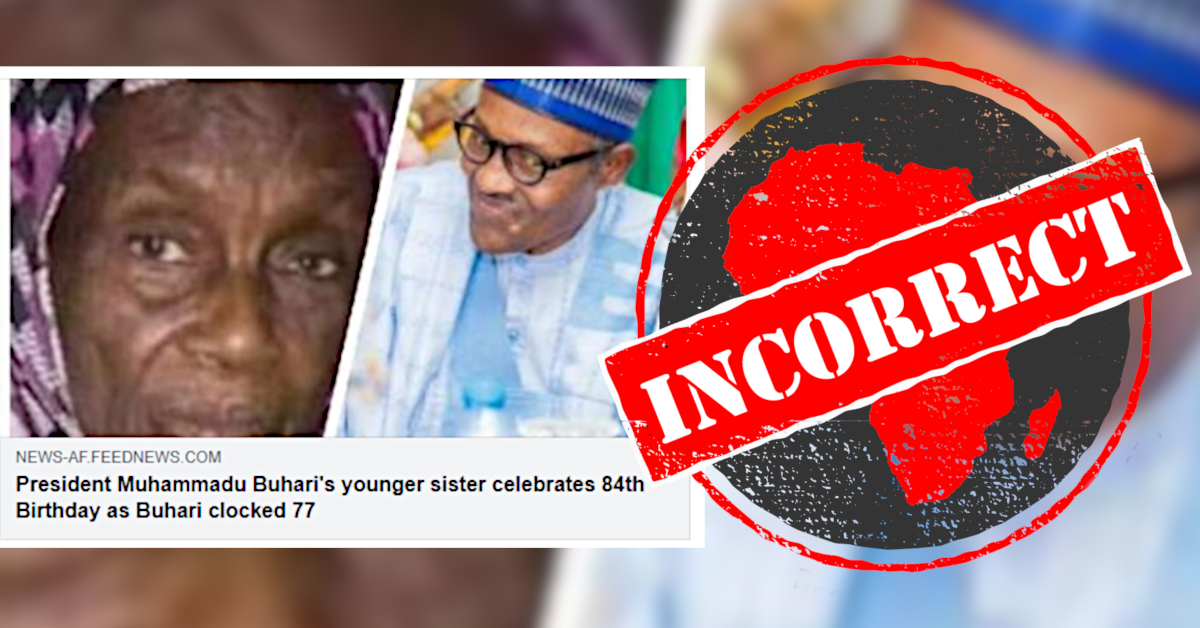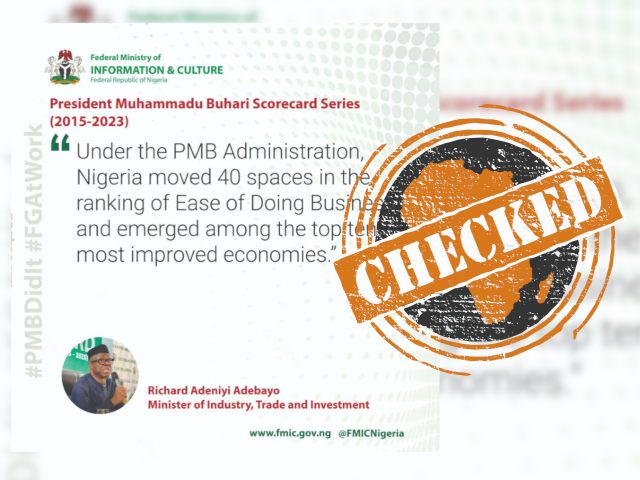A report claiming that Nigeria’s president Muhammadu Buhari has an 84-year-old “younger sister” has been shared over 11,000 times on Facebook.
Published in December 2019, the headline of the article is “Buhari’s younger sister celebrates 84th Birthday as Buhari clocked 77”. The president’s birthday was widely reported by the Nigerian press.
But the article says: “Hajia Rekiyat Adamu who hails from Daura, Katsina State was born in December 1949 into the family of Hardo Adamu and Zulaihat Adamu in Katsina State … President Buhari who hails from Daura, Katsina State was born on 17 December 1942 into the family of Hardo Adamu and Zulaihat Adamu in katsina State.”
If the president’s sister was born in 1949, that would mean she had turned 70 in December 2019, not 84. How old is Buhari’s sister really?

Buhari’s only surviving sister, Hajia Rakiya Adamu, was in the news in February 2017 when she was interviewed by Nigeria’s main newswire, the News Agency of Nigeria, while the president was in hospital in London in the UK.
She urged Nigerians to pray for Buhari’s recovery and said she spoke with him every day, dispelling rumours that the president had died in London.
In all accounts of the 2017 interview in national newspapers Africa Check reviewed, she was introduced as Buhari’s 84-year-old older sister. That would make her 87 now or born around 1932.
The octogenarian was quoted as saying that their mother died in 1992 and that “Buhari was her last born”.
Buhari’s date of birth is recorded as 17 December 1942. While his sister’s exact date of birth is not known, it was by all accounts not in 1949, and she is older than him, not younger. – Allwell Okpi
Published in December 2019, the headline of the article is “Buhari’s younger sister celebrates 84th Birthday as Buhari clocked 77”. The president’s birthday was widely reported by the Nigerian press.
But the article says: “Hajia Rekiyat Adamu who hails from Daura, Katsina State was born in December 1949 into the family of Hardo Adamu and Zulaihat Adamu in Katsina State … President Buhari who hails from Daura, Katsina State was born on 17 December 1942 into the family of Hardo Adamu and Zulaihat Adamu in katsina State.”
If the president’s sister was born in 1949, that would mean she had turned 70 in December 2019, not 84. How old is Buhari’s sister really?

‘Buhari’s only surviving sister’
Buhari’s only surviving sister, Hajia Rakiya Adamu, was in the news in February 2017 when she was interviewed by Nigeria’s main newswire, the News Agency of Nigeria, while the president was in hospital in London in the UK.
She urged Nigerians to pray for Buhari’s recovery and said she spoke with him every day, dispelling rumours that the president had died in London.
In all accounts of the 2017 interview in national newspapers Africa Check reviewed, she was introduced as Buhari’s 84-year-old older sister. That would make her 87 now or born around 1932.
The octogenarian was quoted as saying that their mother died in 1992 and that “Buhari was her last born”.
Buhari’s date of birth is recorded as 17 December 1942. While his sister’s exact date of birth is not known, it was by all accounts not in 1949, and she is older than him, not younger. – Allwell Okpi
Republish our content for free
For publishers: what to do if your post is rated false
A fact-checker has rated your Facebook or Instagram post as “false”, “altered”, “partly false” or “missing context”. This could have serious consequences. What do you do?
Click on our guide for the steps you should follow.
Publishers guideAfrica Check teams up with Facebook
Africa Check is a partner in Meta's third-party fact-checking programme to help stop the spread of false information on social media.
The content we rate as “false” will be downgraded on Facebook and Instagram. This means fewer people will see it.
You can also help identify false information on Facebook. This guide explains how.





Add new comment